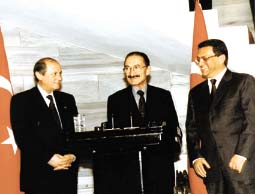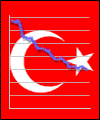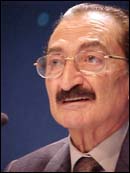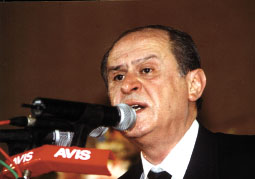23
May 2002
![]()
1. "EU reforms stuck to election barricade", Pandora's box opened Although they ruled out an early poll, leaders open a pandora's box by discussing polls in the fall of 2003. Now it has become even more difficult to legislate reforms required to promote Turkey's European Union membership bid
2. "Ailing premier, fragile economy cloud prospects for Turkey's ambitious reform program", an aging leader with health problems, seen as out of touch with a fast-changing society, is ousted by a young and ambitious politician impatient for reform.
3. "PM's illness puts Turkey on the brink of collapse", the coalition government in Turkey held a summit meeting in a hospital ward yesterday as the increasingly frail Prime Minister, Bulent Ecevit, faced growing calls to step down due to ill health. The country's political and economic future may well hang on Mr Ecevit's health, and his illness has set alarm bells ringing in Ankara and abroad.
4. "Bahçeli refused to discuss death penalty ban, mother tongue education", Deputy Prime Minister and chairman of the far right Nationalist Movement Party (MHP) Devlet Bahçeli used a meeting of coalition leaders Tuesday to speak out against the controversial issues of education right in mother tongue and banning of capital punishment, party sources revealed.
5. "Turkey condemns Armenian genocide film at Cannes as 'propaganda'", Turkey's culture minister on Wednesday denounced as "propaganda" a new movie, shown at the Cannes film festival (news - web sites), about the mass killings of Armenians in eastern Turkey.
6. "Clerides, Greek premier discuss looming crisis with Turkey", Cypriot President Glafcos Clerides met with Greek's Premier Costas Simitis Wednesday to discuss ways to deal with the deadlock in talks to reunify Cyprus and the Turkish threats to annex the Turkish-occupied part of the island.
1. - Turkish Daily News - "EU reforms stuck to election barricade":
Pandora's box opened Although they ruled out an early poll, leaders open a pandora's box by discussing polls in the fall of 2003. Now it has become even more difficult to legislate reforms required to promote Turkey's European Union membership bid
Reforms not now Headed by the MHP, at a time when opposition parties are so pressing for an early general election, none of the three partners can dare to act to save Ocalan from gallows, talk on education and broadcasting in Kurdish Europe presses The European Parliament Foreign Relations Commission urges Turkey to speed up reforms. A report stresses the progress in Turkey's reform drive since 2001, but states that more reforms are needed
ANKARA / 23 May 2002 / by Ayla Ganioglu
It has become all the more difficult for the three-way coalition
government of Turkey to take decisions on the critical abolition of
the death penalty, education and broadcasting rights in Kurdish issues
as the leaders of the coalition government, although rejected calls
for early elections, opened the Pandora's box themselves by discussing
the possibility of polls in the fall of 2003.
According to political observers the early election expectation has now become the most daunting obstacle against those reform moves.
Particularly the senior coalition partner Nationalist Movement Party (MHP) can accept, at a time when election anticipations in the country are so spread, any step taken in those critical areas that may create serious backlash at its grassroots.
The opposition parties, who have been campaigning for an early election, are very unlikely to lend support to any efforts by the coalition parties to lift capital punishment and thus save the country's number-one public criminal separatist chieftain death-row inmate Abdullah Ocalan from the gallows.
On the contrary, the opposition parties would use any such efforts by the government against the coalition partners in the campaign for early elections.
Coming together in a hospital room, because of the illness of Prime Minister Bulent Ecevit, for the first time after 20 days the coalition leaders have postponed to June taking key reform decisions Turkey had pledged in its EU National Program.
At the same meeting junior coalition partner Motherland Party (ANAP) leader Deputy Prime Minister Mesut Yilmaz suggested to his coalition partners to hold early polls in the fall of 2003, some six months ahead of the scheduled polls in 2004. Ecevit and Bahceli are reportedly opposed to the suggestion of Yilmaz and eventually the three leaders declared in a statement that early polls were not on the agenda of the government.
In the political corridors, on the other hand, analysts pointed at the fact that this was the first time that the three coalition leaders discussed amongst themselves the possibility of early elections and thus have opened a Pandora's box. In the mean time, leaving for Brussels yesterday, Yilmaz denied reports in the media that he had asked for early polls be held on Oct. 19. He said he suggested "fall of 2003" without a date, but early polls were not "on our agenda, we shall evaluate that later." This contradictory statement of Yilmaz, according to analysts, also pointed to the fact that an election is seen at the end of the tunnel and the issue was only its timing.
Indeed, the "no early elections" statement after the meeting of the three leaders did not end speculations and discussions on early elections, but on the contrary boosted the anticipations. In an atmosphere like this when election anticipation is so high, therefore, it has become even more difficult to legislate the reforms the EU has been expecting from Turkey.
Political sources have pointed out to the "clear hardening" in the position of the MHP particularly on the issue of the lifting of the death penalty. The MHP is already under strong pressure of its grassroots because of its acceptance to hold the death penalty file of Ocalan at the Prime Ministry -- pending an appeal to the European Court of Human Rights -- and political analysts say expecting the MHP to accept lifting of the death penalty by a government in which it is a coalition partner would be suicidal for that nationalist party.
The MHP came out second from the 1999 elections on an election pledge that if it came to power would hang Ocalan.
A senior MHP official told the TDN Wednesday that Ocalan could not be saved from the gallows while the MHP remained in government. "A new government may come and that government may save Ocalan. But we cannot agree to such a move by a government we are in," he said.
MHP leader Deputy Prime Minister Bahceli had said when the lifting of the death penalty was first suggested that his party was opposed to lifting of the capital penalty for crimes of terrorism, but would not oppose it if the DSP and ANAP legislated it through Parliament with the support of the opposition.
But, MHP officials rule that out now and say such a move by DSP and ANAP would bring the end of the three-way coalition government. MHP officials also rule out any support to their partners in government in education and broadcasting in Kurdish reforms.
Similarly, the opposition parties, at a time when elections are so high on the agenda of the country, would not support a move that may save Ocalan from the gallows, analysts underlined. The main opposition True Path Party (DYP) has been stressing ever since the start of the debate on the death penalty that it won't oppose its lifting, but only after Ocalan was hanged. With that attitude the DYP is trying to lure voter support from MHP grassroots.
Analysts also stated that the pro-Islamist Saadet Party
(SP) and the Justice and Development Party (AKP), similarly, would not
oppose such reforms at a time when there is so high anticipation of
early elections. ![]()
2. - AP - "Ailing premier, fragile economy cloud prospects for Turkey's ambitious reform program":
ISTANBUL / 22 May 2002 / by Ben Holland
An aging leader with health problems, seen as out of touch with a fast-changing
society, is ousted by a young and ambitious politician impatient for
reform.
That was how Bulent Ecevit rose to the top of Turkish politics three decades ago, unseating octogenarian war hero Ismet Inonu as leader of the country's oldest party. Now it's Ecevit, hospitalized last week, who is the ailing elder statesman and the target of growing calls for change at the top.
Government leaders, who gathered Tuesday at the Ankara hospital where Ecevit,76, is undergoing treatment for a broken rib and a vein infection, issued a firm statement ruling out a change of government until 2004 when elections are due.
But it has been decades since a Turkish government served
out a full term, and the leaders' show of defiance may not be enough
to quash speculation that Ecevit's health problems will force some kind
of change in the government before then.
Some see Ecevit as irreplaceable. They say his personal authority is
the only thing holding fractious coalition partners together, and his
departure would make elections inevitable.
With the economy also in intensive care — it shrank 9.4 percent amid last year's crisis and is only now steadying under an International Monetary Fund (news - web sites)-backed recovery program — that's an alarming prospect for many Turks.
"An early election atmosphere would be the end of everything," wrote economist Gungor Uras in the daily Milliyet. "Stability would be gone, the exchange rate would be out of control, nobody would invest or spend money."
Polls show the likely winners of a snap election would be pro-Islamists, who could trigger new tensions with Turkey's fiercely secular military. Their leader Recep Tayyip Erdogan said Wednesday that Ecevit's hospitalization had left Turkey "one of the world's most unstable countries headless and without a premier."
Many analysts believe, however, that Ecevit's departure needn't force an early election. They point out that the coalition parties enjoy a sizeable majority in parliament, and are likely to delay elections as long as they can. All three have seen their standing in opinion polls plummet amid the crisis, and need time to secure concrete economic improvements they can trumpet in an election campaign.
Others say the current coalition is holding back economic recovery.
"The fact that Turkey has still not been able to overcome the crisis is due mainly to the existence of this very government," wrote Sukru Elekdag, a former ambassador, in the daily Sabah. "Under the circumstances, an early election becomes the way out, despite all the hazards involved."
Surprise backing for early elections has come from Kemal Dervis, the economy minister and chief architect of the recovery program. He says there's no reason why an election campaign should destabilize an economy which, thanks to his program, is now less vulnerable to populist political meddling.
Dervis, who has his own political calculations to make as a popular independent wooed by several parties, has even argued that setting an election date could help the economy by dispelling uncertainty.
Business leaders, who broadly support Dervis' policies, disagree.
"I don't believe an early election will help Turkey," said Tuncay Ozilhan, head of the country's most influential business group. He said a higher priority was changing Turkey's election laws, to prevent another unwieldy coalition emerging from future polls.
If Ecevit's sickness prevents him from performing his duties — temporarily or permanently — then one of his deputy prime ministers could fulfill the role, Ozilhan suggested.
A leading candidate would be Devlet Bahceli, who heads the nationalist party that is the government's second-largest member.
But a Bahceli-led government might struggle to make headway with the political and human rights reforms that the European Union (news - web sites) is demanding as a criteria for membership — one of Ankara's key foreign policy goals.
Bahceli's nationalists are widely seen as the main obstacle to these changes, which include abolishing the death penalty and relaxing laws that bar Turkey's estimated 12 million Kurds from broadcasting and education in their native tongue.
Ismail Cem, the foreign minister, and the government's backstage fixer Husamettin Ozkan — both members of Ecevit's Democratic Left Party and potential successors — might be better placed to push forward Turkey's EU bid, which is entering a crucial phase.
Turkey seeks a date from the EU for opening full membership talks before the end of this year. To do so, it may need to step up the pace of reform, and show flexibility over talks on the reunification of divided Cyprus.
Added to the IMF's demands, it makes up a daunting agenda
— even for a government with a healthy premier. ![]()
3. . - The Independent - "PM's illness puts Turkey on the brink of collapse":
ISTANBUL / 22 May 2002 / by Pelin Turgut
The coalition government in Turkey held a summit meeting in a hospital
ward yesterday as the increasingly frail Prime Minister, Bulent Ecevit,
faced growing calls to step down due to ill health.
The country's political and economic future may well hang on Mr Ecevit's health, and his illness has set alarm bells ringing in Ankara and abroad.
Newspapers have speculated for several months that Mr Ecevit suffers from a disease of the nervous system that also impairs his motor skills. He has appeared shaky and made several public blunders.
But the ruling elite is desperate to keep Mr Ecevit, a staunch secularist, in power because he has no natural successor and there are fears that his departure would lead to a return to power for Islamists.
"Nothing is clear after Ecevit," said a commentator in the Milliyet daily, Hasan Cemal. "The entire political structure could collapse."
The 76-year-old veteran leader was admitted to the hospital on Friday – the second time in 10 days. He is being treated for an infection in his leg and a cracked rib sustained in a fall, apparently off a chair.
As the country struggles to climb out of its worst recession since the Second World War, the sight of Mr Ecevit inching his way up hospital steps sent the Turkish currency to its lowest point since last autumn, and the stock market plummeted.
The leaders of the three-party coalition met at the Ankara Baskent hospital where Mr Ecevit is being treated. They issued a statement afterwards ruling out an early election. "An end to the debate about early elections would be good for the country and the economy," they said.
But political opponents demanded medical proof that Mr Ecevit was fit to govern.
"We want the results of a full medical inquiry to be disclosed to the public," said the leader of the opposition True Path Party, Tansu Ciller, in the daily newspaper, Hurriyet.
Mr Ecevit's resignation would almost certainly upset the delicate left-right coalition, leading to early elections, and could derail an economic rescue plan backed by the International Monetary Fund.
Early elections are a nightmarish prospect for Ankara's strictly secularist establishment and military – a powerful force behind the scenes – as all opinion polls indicate voters would overwhelmingly return the pro-Islamist Justice and Development Party to power.
None of the three current ruling parties looks likely to even cross the 10 per cent threshold needed to win seats in parliament. Economic hardship, the tough IMF programme and politics as usual have not been popular.
Mr Ecevit was resurrected as a viable political alternative after the former Islamist prime minister Necmettin Erbakan was forced out of office in a "soft coup" in 1997.
A pro-labour leftist in the 1970s, he has led Turkey's IMF-backed economic recovery plan since taking office in 1999. His brand of old-school secularism does not resonate as much with his coalition partners, Devlet Bahceli of the far-right Nationalist Action Party, and Mesut Yilmaz of the liberal Motherland Party, who are more concerned not to alienate their religious and conservative constituencies. Neither is there an heir apparent in his Democratic Left Party, which Mr Ecevit and his wife, Rahsan, have led with an iron fist for the best part of three decades.
Public opinion polls show the Islamist leader Recep Tayyip
Erdogan would almost certainly lead if early elections were to be held
this year. Mr Erdogan, former mayor of Istanbul, was jailed for 10 months
in 1998 on sedition charges. He now says he advocates a model of Islamic
democracy. But the generals are deeply sceptical of Mr Erdogan's rhetoric
and are unlikely to allow the party back in power. ![]()
4. - NTV / MSNBC - "Bahçeli refused to discuss death penalty ban, mother tongue education":
The details of the recent leaders’ summit, held in an Ankara hospital, become clearer as sources speak out.
ANKARA / 23 May 2002
Deputy Prime Minister and chairman of the far right Nationalist
Movement Party (MHP) Devlet Bahçeli used a meeting of coalition
leaders Tuesday to speak out against the controversial issues of education
right in mother tongue and banning of capital punishment, party sources
revealed.
Bahçeli is reported to have demanded that the meeting between Prime Minister Bülent Ecevit, the two other government, Deputy Prime Ministers Mesut Yilmaz and Hüsamettin Özkan, and other senior officials not even consider the issues.
“These not things are not to happen and so do not waste time,” the MHP leader is reported to have said in reference to removing the death penalty from the statute books or allowing education in languages other than Turkish. During the meeting, the leaders were briefed by Foreign Ministry officials on Turkey’s bid to gain full membership of the European Union. The briefing discussed the abolition of the death penalty, education and broadcast rights in mother tongue languages and the lifting of emergency rule in four eastern and south eastern provinces.
Bahçeli reportedly said that everyone knew their
views and was strongly opposed to any changes being made, whereupon
Motherland Party leader Yilmaz and Deputy Prime Minister Hüsamettin
Özkan called for discussion of these issues to be postponed to
a later date. ![]()
5. - AP - "Turkey condemns Armenian genocide film at Cannes as 'propaganda'":
ANKARA / 22 May 2002
Turkey's culture minister on Wednesday denounced as "propaganda"
a new movie, shown at the Cannes film festival (news - web sites), about
the mass killings of Armenians in eastern Turkey.
Istemihan Talay said the film "Ararat," which recalls the plight of Armenians in Ottoman Turkey, was "aggressive" and hurt relations between Armenians and Turks. The film by director Atom Egoyan opened in Cannes on Monday.
"It's wrong to use a universal art such as cinema in a way to distort the truths of history and to create animosity between societies, nations, and countries," Talay said.
Armenians say a 1915-1923 campaign to force them out of eastern Turkey amounted to a genocide and some 1.5 million people were killed. Turkey, which denies the genocide, says the figures are inflated and says Armenians died during civil unrest.
State Minister Yilmaz Karakoyunlu, the government spokesman, also spoke out against the film.
"This is one example of a campaign waged against Turkey," Karakoyunlu said.
Some Turkish civil groups have called for a boycott against Miramax, which released the film, and the Walt Disney Co., its parent company.
The film leaps between 1915 Turkey and present-day Canada
and shows how history affects two Canadian families. The characters
are struggling to come to terms with the loss of loved ones and look
to the past for answers. ![]()
6. - AP - "Clerides, Greek premier discuss looming crisis with Turkey":
ATHENS / 22 May 2002
Cypriot President Glafcos Clerides met with Greek's Premier Costas
Simitis Wednesday to discuss ways to deal with the deadlock in talks
to reunify Cyprus and the Turkish threats to annex the Turkish-occupied
part of the island.
"We want the coordination of our actions" to resolve the division and to ensure the island's successful entry into the European Union (news - web sites), Simitis said.
The meeting follows last week's visit to Cyprus by U.N. Secretary General Kofi Annan (news - web sites) and his failure to revive the U.N.-sponsored reunification talks between Clerides and Turkish Cypriot leader Rauf Denktash.
Denktash is widely being blamed for the impasse for insisting on international recognition for his breakaway state declared in the occupied north and recognized only by Ankara.
Annan has said the two sides should be able to resolve their core differences by the end of June.
Simitis stressed the importance of keeping to a timeline. "We can't discuss indefinitely. There must be an end-date for these talks," he said.
The Clerides-Denktash talks have taken on extra urgency because of Cyprus' expected entry into the EU by next year, and Turkish threats to annex the north if the island joins before its reunification as a federation of two independent states.
The U.N. has ruled out recognition of the breakaway state, and has called for the reunification of Cyprus as a single state with two federal regions.
Cyprus was split into a Greek Cypriot-controlled south
and an occupied north in 1974 when Turkey invaded in the wake of an
abortive coup by supporters of union with Greece. ![]()